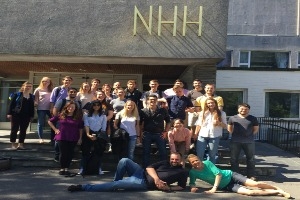Business
Exploring Social Entrepreneurship While Climbing Mountains in Norway
Eight AU MGMT-396 Students Join International Participants for Two-week Summer Program

AU Students in front of NHH. Credit: Siri Terjesen
For two weeks this summer, the undergraduate course MGMT-396: Non-profit and Social Entrepreneurship was taught like a graduate-level seminar.
From June 19-30, Dr. Siri Terjesen, Associate Professor of Management and Interim Director of the AU Center for Innovation, brought eight AU undergraduate students to the Norwegian School of Economics (NHH) in Bergen, Norway, for a two-week intensive session.
Of the 25 students who participated (who were from ten countries and universities all over the world), AU’s cohort represented the only undergraduates—the rest were postgraduate students pursuing master’s degrees.
“It was a neat stretch for our AU students,” Terjesen says. “They really rose to the challenge.”
Many AU students were also pursuing majors other than business. “It was a very steep learning curve,” says Victoria Holton, a rising junior studying international relations. “But I enjoyed it.”
Learn. Climb Mountains. Repeat.
Certainly, the opportunity to visit Norway was a good motivator for the students to participate in the program.
David Peters, CLEG ’19, was excited to visit the country for the first time, particularly since it’s where much of his family is from, “Most days I would go for a hike up one of the seven mountains surrounding Bergen,” he said. “Since it stays light out well past 10 o’clock, there was plenty of time to do longer hikes without fear of it getting dark.”
The students also regularly played pick-up soccer games with the other participants, played cards in the dormitories, and explored other parts of Bergen and the surrounding areas.
But that was only after class ended each day. From 9 a.m. to 4 p.m., with an hour break for lunch, the students were busy with their studies. Terjesen and her co-professor Bram Timmermans, Associate Professor at NHH, lectured on topics like the ethics of social entrepreneurship and how to measure social value in non-profits.
Class time also involved a variety of other activities, like guest lectures from local social entrepreneurs and a computer simulations in which students operated new start-ups in the clean-energy sector. During this in-class activity, students were responsible for overseeing the growth of their technology by setting prices, making hiring decisions, and more. The winning teams were determined based on the company’s final market value and the satisfaction level of the employees.
Holton says the classroom sessions provided the students with the “theoretical knowledge” they would need. She appreciated the opportunity to find “a real-life application for the theories we learned.”
Experiential Learning with Real-World Benefits
Students also had the opportunity to apply their knowledge to a real Norwegian business. Each AU participant joined a group project, where they helped a local non-profit become financially viable. Their final assignment included writing a report outlining their recommendations for the business.
Holton’s group worked with a company called Papillon, named after the French word for butterfly, which helps recent female refugees integrate into Norwegian society by providing emotional and career counseling, music therapy for those that have endured trauma, language classes to improve their job prospects, and sewing workshops.
“We determined that the sewing workshops could most easily be monetized,” Holton says. “We put together a plan for them to create a product that could be sold in the stores in downtown Bergen.” The students also created a plan for Papillon to create a website so refugees could find information on its programs, and customers could easily purchase the company’s products.
For some of the students, the learning continued even after the program ended. Three of the AU students stayed in Norway to intern with a social venture for the duration of the summer, an arrangement made possible by a Norwegian government grant through its Norwegian Centre for International Cooperation in Education (SIU). Also, two NHH graduate students came to AU to intern for the AU Center for Innovation incubator venture MEANS Database, a start-up that disseminates extra food to those in need. Travel and accommodation expenses for all five students was covered by the SIU grant.
Learning Different Perspectives—and Sharing Their Own
Students learned about the differences between American and Norwegian businesses during the program. “This provided them with a chance to appreciate the differences across countries and how people can start and grow their businesses,” Terjesen says.
Lauren Lane, BSA ’19, said she learned about regulations placed on Norwegian businesses, and about how many of the country’s non-profits receive substantial government financial support.
In addition to learning about business in Norway, the AU students also learned about other countries from the international students in the program.
“It was interesting because I didn’t know about specific laws in Argentina,” Lane says, citing one example of an Argentine business that builds houses for low-income people.
Lane said she appreciated the chance to learn about other perspectives and share her viewpoints as well. Despite being an undergraduate accounting major in a master’s program, “I still brought another point of view to the table,” she says. While her background was different from many of the other students, Lane used the fundamental accounting knowledge she learned at AU to offer insightful ideas for her group project.
“I am really pleased that our AU undergraduates were able to make meaningful contributions to a graduate-level course and to the Norwegian social ventures’ strategic planning,” Terjesen says. This was the first time the program in Norway was offered to AU students, but she hopes there will be more international, experiential learning opportunities for students in the future.
